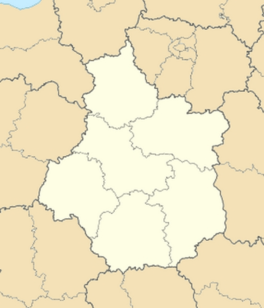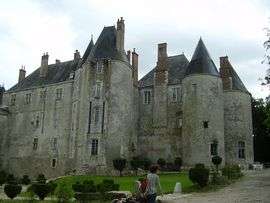Meung-sur-Loire
| Meung-sur-Loire | ||
|---|---|---|
|
Château of Meung-sur-Loire | ||
| ||
 Meung-sur-Loire | ||
|
Location within Centre-Val de Loire region  Meung-sur-Loire | ||
| Coordinates: 47°49′46″N 1°41′57″E / 47.8294°N 1.6992°ECoordinates: 47°49′46″N 1°41′57″E / 47.8294°N 1.6992°E | ||
| Country | France | |
| Region | Centre-Val de Loire | |
| Department | Loiret | |
| Arrondissement | Orléans | |
| Canton | Meung-sur-Loire | |
| Government | ||
| • Mayor (2008–2014) | Pauline Martin | |
| Area1 | 20.35 km2 (7.86 sq mi) | |
| Population (2012)2 | 6,115 | |
| • Density | 300/km2 (780/sq mi) | |
| Time zone | CET (UTC+1) | |
| • Summer (DST) | CEST (UTC+2) | |
| INSEE/Postal code | 45203 / 45130 | |
| Elevation |
82–113 m (269–371 ft) (avg. 100 m or 330 ft) | |
|
1 French Land Register data, which excludes lakes, ponds, glaciers > 1 km² (0.386 sq mi or 247 acres) and river estuaries. 2 Population without double counting: residents of multiple communes (e.g., students and military personnel) only counted once. | ||
Meung-sur-Loire (French pronunciation: [mœ̃ syʁ lwaʁ]) is a commune in the Loiret department in north-central France.
It was the site of the Battle of Meung-sur-Loire in 1429.
Geography
Meung-sur-Loire lies 15 km to the west of Orleans on the north bank of the River Loire at the confluence with the River Mauves. The Mauves, actually three rivers, have their source in the water table of the productive agricultural region of the Beauce.
 The Loire at Meung-sur-Loire
The Loire at Meung-sur-Loire The Mauve in Meung-sur-Loire
The Mauve in Meung-sur-Loire
History
There is evidence of mesolithic settlements at « Mousseau » and « La Haute-Murée ».[1]
A Gallo-Roman fortified village recorded as Magdunum was built in the marais adjoining the river, which in 409 was fired by the invading Alans. The marais was drained, according to tradition by Saint Liphard around the year 520. The canalisation formed the watercourses known as the mauves. He went on to build the chapel which was to become the monastery and the abbey. His relics were deposited in the church in 1104, the year after Louis VI had founded as fortress.
During the 12th century the church was rebuilt in the gothic style, and fortified accommodation for tha abbot built alongside. Jeanne d'Arc visited in 1429, and this was the site of the Battle of Meung-sur-Loire. The complex was restored in 1570, again during the 19th century and again in 1985.
The river defined the town, in 1857, 38 mills had the right to use the waters of the rivers to power themselves.
Fiction
In fiction, it has been described by Alexandre Dumas in The Three Musketeers as the village where d'Artagnan, en route to join the King's Musketeers in Paris, first encounters the villainous Comte de Rochefort. Also in fiction, Meung-sur-Loire is the country home of Chief Inspector Jules Maigret, Georges Simenon's classic crime fiction character. Maigret and his wife Louise eventually retire to their Meung-sur-Loire home, where he spends his time fishing (pike), and she tends, according to her sister, any number of animals.[2]
Points of interest
- The town is twinned with Lymm in Cheshire, England
- Arboretum des Prés des Culands
- Château de Meung-sur-Loire
Notable residents
- Jean de Meun (c. 1240 – c. 1305), author of the Roman de la Rose
See also
References
| Wikimedia Commons has media related to Meung-sur-Loire. |

